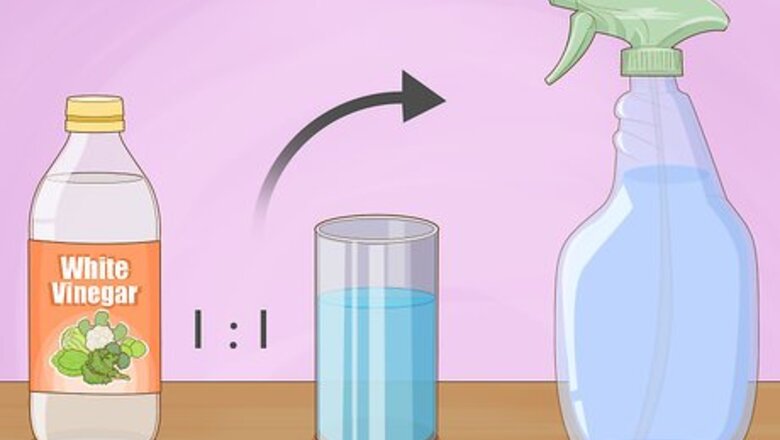
views
Getting Rid of Light Stains with Vinegar
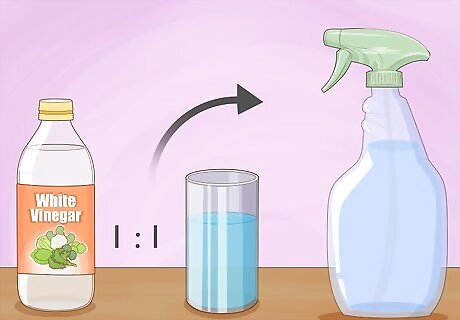
Mix 1 part white vinegar and 1 part water in a spray bottle. Fill a spray bottle halfway with water and halfway with white vinegar. Close the bottle and shake it to mix the solution well.Tip: This method is also safe for wood that is coated in paint or lacquer. The vinegar and water solution won’t harm the finish. This method will work for light rust stains, such as if you set something rusty on a wooden surface for a short period of time and it left some residue behind. It won’t work for deeper rust stains, such as from a rusty nail that had been embedded in the wood for a long time or an old tool that was sitting on the wood for a long period of time.
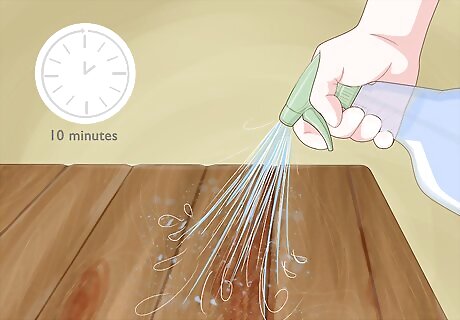
Spray the solution onto the rust stain and let it sit for 10 minutes. Spritz enough of the solution onto the wood to completely cover the stain. Let it sit for at least 10 minutes to soak in. Keep the bottle with the solution handy so you can moisten the stain again as you clean it.
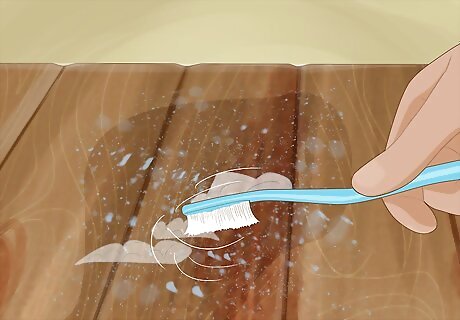
Scrub the solution into the rust stain with an old toothbrush. Scrub with light to medium pressure until the stain is gone. Spray more of the solution onto the stain as you go to keep it wet while you scrub. You can use another kind of soft-bristled brush if you don’t have an old toothbrush around. Just make sure you don’t use anything that will damage the wood, such as a hard-bristled wire brush.
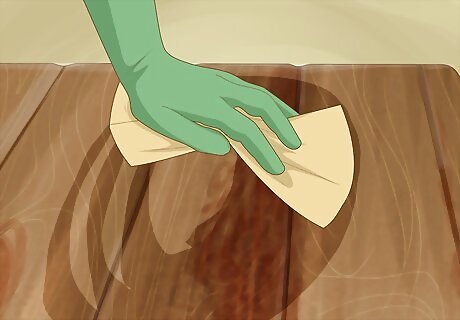
Wipe away the vinegar solution with a clean damp cloth. Soak the cloth under a running faucet and wring out the extra water so it isn’t dripping. Wipe down the wood to remove the residue left behind by the vinegar solution. Wipe off any excess water from the surface of the wood with a dry cloth. If the stain did not come off using this method, you will need to try bleaching the stain with oxalic acid.
Bleaching Tough Stains with Oxalic Acid
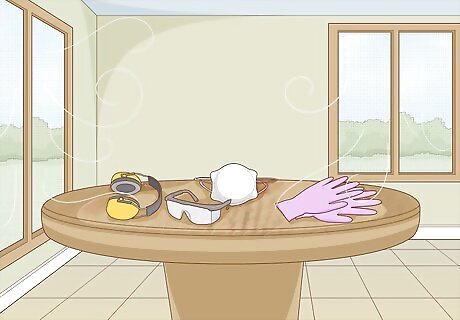
Choose a well-ventilated area to work in. Take the rust-stained wood outside or into a garage workshop and open up the door if you can. Open up all doors and windows in the room if the wood is too big to move or you don’t have another space to work in. This method is recommended for tough rust stains, such as when a metal object has been left in or on the wood for extended periods of time (like a nail or an old tool). It also may alter the finish of wooden objects that are painted or have a lacquer on them, so it’s important to test the cleaner first.
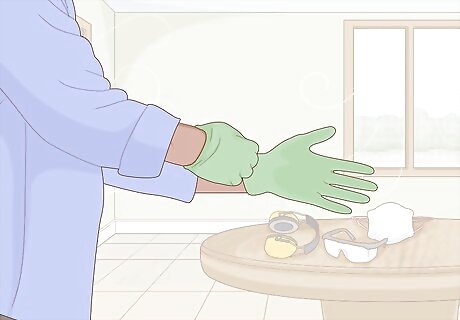
Put on protective gear to keep you from inhaling or touching the cleaner. Wear gloves to protect your hands from the oxalic acid and a facemask to keep you from breathing it in. Wear safety glasses to protect your eyes and a long-sleeved top with long pants to protect other parts of your skin. Oxalic acid is toxic and can cause extreme irritation and even burns if you get it on your skin or in your eyes. If this happens, rinse the affected area off immediately under cool running water for at least 15 minutes. If a burning sensation continues, then call 911 for assistance.
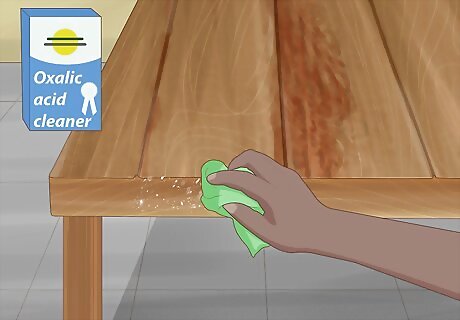
Test the oxalic acid cleaner on a hidden area of the wood. Pour a bit of powdered oxalic acid cleaner on a wet old toothbrush and scrub it onto a small out-of-sight area of the wood. Wipe it away with a damp clean cloth and check to see if it damaged the finish or discolored the wood at all. Oxalic acid is a common powdered household chemical that you can buy at a home improvement center or anywhere else that sells household chemicals. It is sometimes sold under a unique brand name and marketed as a rust cleaner.
Sprinkle oxalic acid over the rust stain. Pour out just enough of the oxalic acid cleaning powder to cover the stained area. Avoid getting it on anything but the wood you are cleaning, as it can damage other types of surfaces. If the wood is small enough to do so, it’s a good idea to put it on top of a workbench or another surface that you aren’t worried about damaging.
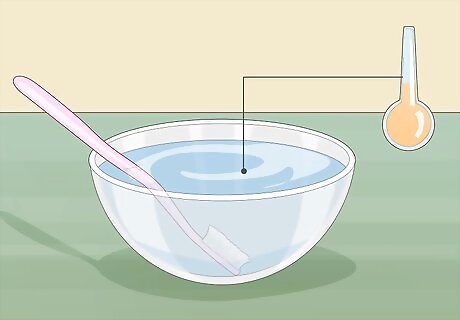
Dip the old toothbrush into a bowl of warm water to moisten it. Fill a ceramic or glass bowl with warm water. Dip the bristles of the toothbrush into the bowl to saturate them. Don’t use a metal bowl because the oxalic acid might damage it. A glass or ceramic bowl are the safest options to use.
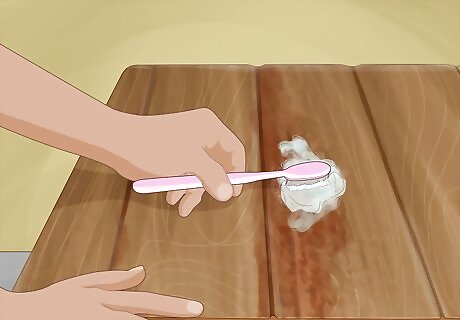
Scrub the oxalic acid powder into the stain until it turns into a paste. Gently scrub the powder covering the stain with the bristles of the toothbrush. Use back and forth and circular motions. Dip the toothbrush into the bowl of water as you go if you need more water to turn the powder into a paste.
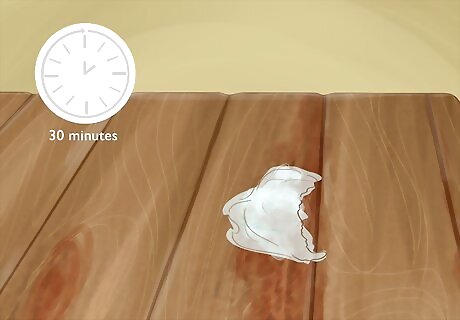
Let the paste sit on the stain for 30 minutes or until it dries out. Wait until the water has evaporated and the paste has turned into a white crust. The crust will have now absorbed most or all of the stain and it will look clearer underneath. Don’t worry if you can’t tell whether the stain is gone through the crust, you will be able to check after you wipe it off and repeat the process if necessary.
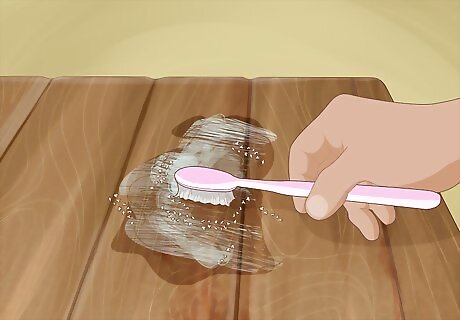
Moisten the toothbrush and scrub the crust to get it wet again. Dip the toothbrush into the bowl of water to dampen it and scrub the crust to turn it into a paste. Keep dipping the toothbrush and scrubbing until it is completely moistened. This will allow you to wipe the cleaner off of the surface and see the results underneath it.
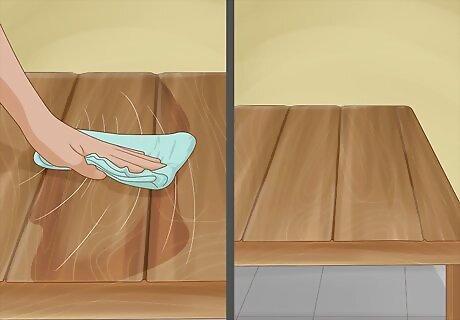
Wipe off the paste with a clean cloth. Use a clean rag or some paper towels to wipe off the paste. Scrub more water into any parts that are hard to wipe off to moisten them further. Let the wood air dry after wiping off all the paste.Tip: After removing rust stains from wood that has a finish, you can rub a bit of mineral oil onto the wood to restore the finish if it is looking a little dull after the cleaning. If the stain is still there after you completely wipe off the oxalic acid, then repeat the process from the beginning to remove it. If the stain is not gone after 2 applications, then you might need to sand and refinish the wood to remove it.




















Comments
0 comment